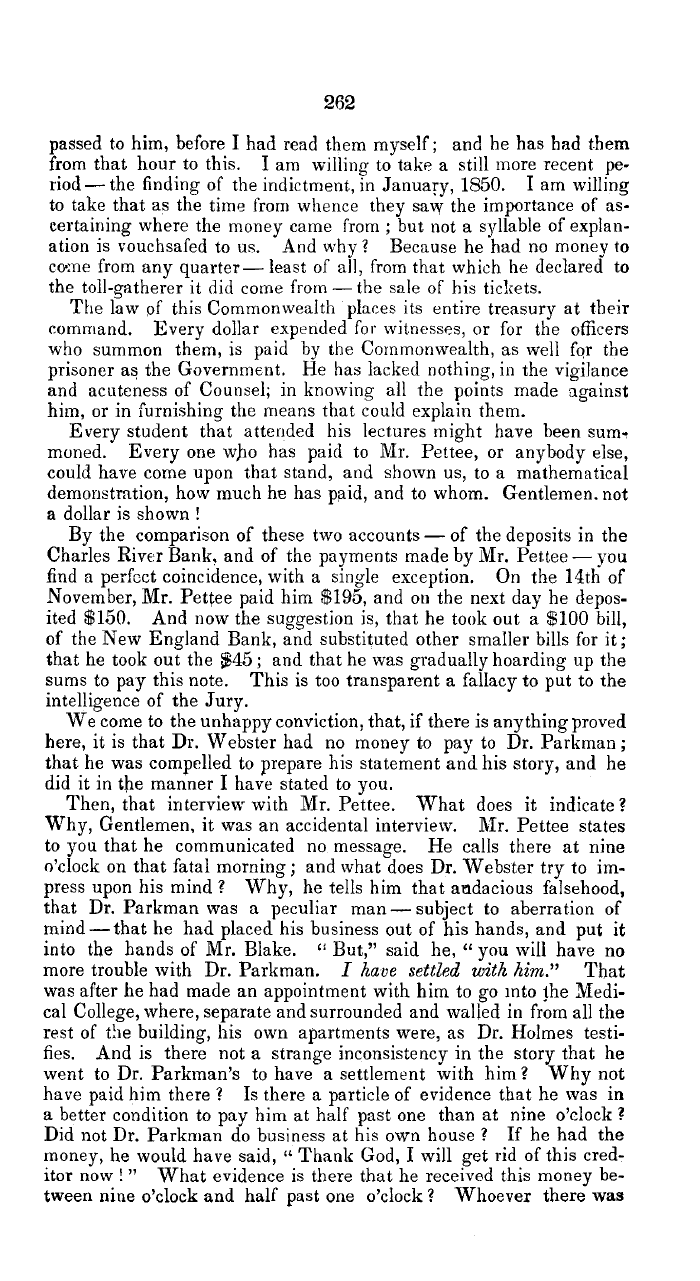|
262
passed to him, before I had read them myself; and he has had them
from that hour to this. I am willing to take a still more recent pe-
riod-the finding of the indictment., in January, 1850. 1 am willing
to take that as the time from whence they saw the importance of as-
certaining where the money came from ;but not a syllable of explan-
ation is vouchsafed to us. And why? Because he had no money to
co-:ne from any quarter- least of all, from that which he declared to
the toll-gatherer it did come from-the sale of his tickets.
The law of this Commonwealth places its entire treasury at their
command. Every dollar expended for witnesses, or for the officers
who summon them, is paid by the Commonwealth, as well for the
prisoner as the Government. He has lacked nothing, in the vigilance
and acuteness of Counsel; in knowing all the points made against
him, or in furnishing the means that could explain them.
Every student that attended his lectures might have been sum-
moned. Every one wbo has paid to Mr. Pettee, or anybody else,
could have come upon that stand, and shown us, to a mathematical
demonstration, how much he has paid, and to whom. Gentlemen. not
a dollar is shown !
By the comparison of these two accounts - of the deposits in the
Charles River Bank, and of the payments made by Mr. Pettee - you
find a perfect coincidence, with a single exception. On the 14th of
November, Mr. Petlee paid him $195, and on the next day he depos-
ited $150. And now the suggestion is, that he took out a $100 bill,
of the New England Bank, and substituted other smaller bills for it;
that he took out the $45 ; and that he was gradually hoarding up the
sums to pay this note. This is too transparent a fallacy to put to the
intelligence of the Jury.
We come to the unhappy conviction, that, if there is anything proved
here, it is that Dr. Webster had no money to pay to Dr. Parkman ;
that he was compelled to prepare his statement and his story, and he
did it in the manner I have stated to you.
Then, that interview with Mr. Pettee. What does it indicate ?
Why, Gentlemen, it was an accidental interview. Mr. Pettee states
to you that he communicated no message. He calls there at nine
o'clock on that fatal morning; and what does Dr. Webster try to im-
press upon his mind ? Why, he tells him that audacious falsehood,
that Dr. Parkman was a peculiar man- subject to aberration of
mind-that he had placed his business out of his hands, and put it
into the hands of Mr. Blake. '° But," said he, '1 you will have no
more trouble with Dr. Parkman. I )nave settled with him." That
was after he had made an appointment with him to go into the Medi-
cal College, where, separate and surrounded and walled in from all the
rest of the building, his own apartments were, as Dr. Holmes testi-
fies. And is there not a strange inconsistency in the story that he
went to Dr. Parkman's to have a settlement with him? Why not
have paid him there ? Is there a particle of evidence that he was in
a better condition to pay him at half past one than at nine o'clock ?
Did not Dr. Parkman do business at his own house ? If he had the
money, he would have said, °' Thank God, I will get rid of this cred-
itor now ! " What evidence is there that he received this money be-
tween nine o'clock and half past one o'clock? Whoever there was
|

